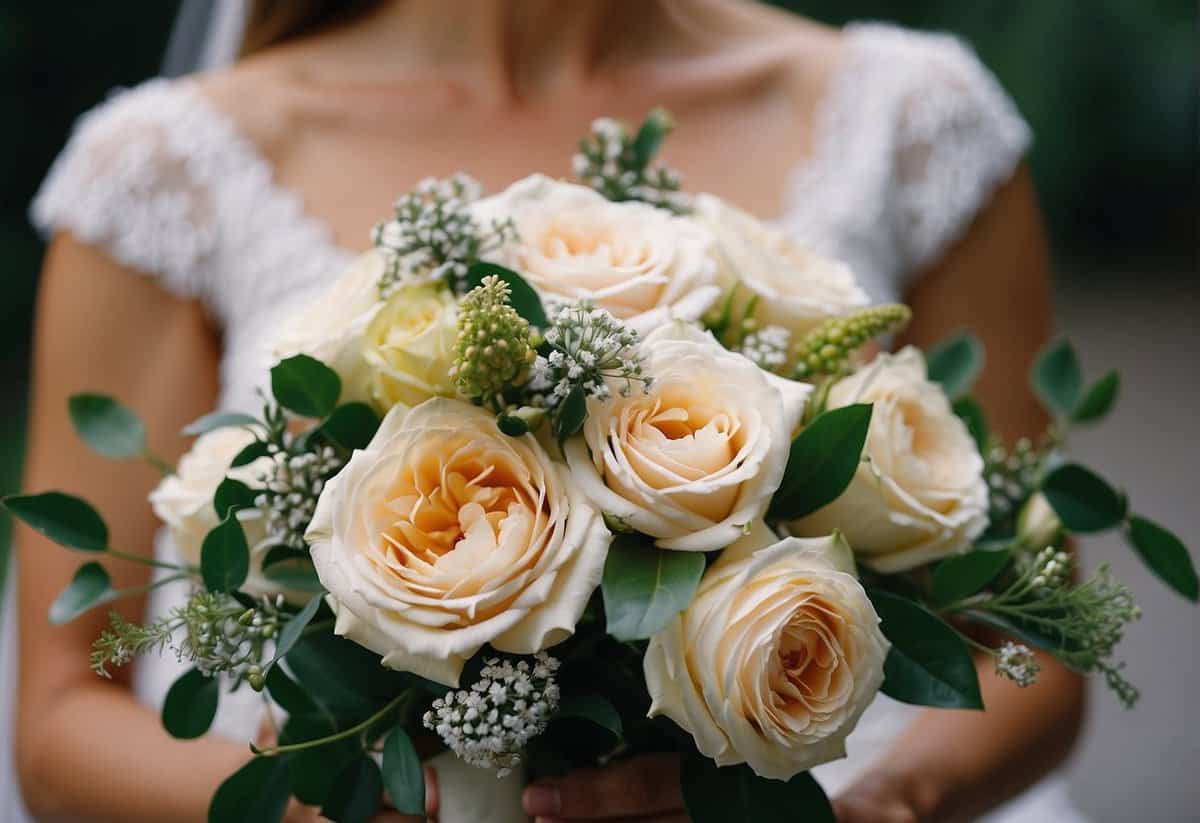Do Brides Plan Their Own Wedding? Insights on Self-Managed Nuptials
Planning a wedding is a significant endeavor that comes with a unique set of challenges and rewards. Many brides choose to take on the task of organizing their own special day to ensure it aligns with their vision of love and celebration. This level of involvement allows you to stitch together your own narrative, each choice and detail reflecting your personal journey and relationship.

As a bride planning your own wedding, you’ll lay the foundation of your day by scouting the perfect venue, curating the guest list, and selecting themes that resonate with your love story. As you craft the experience, you’ll delve into the details, from picking the right flowers and music to ensuring your guests feel welcomed and involved. Managing the logistical aspects efficiently can transform your wedding planning from a daunting to-do list into a fulfilling prelude to your wedding day.
Key Takeaways
- Many brides personally organize their weddings to ensure a personalized touch.
- The planning process involves creative and logistical decisions that shape the wedding day.
- Careful coordination can turn the complexities of wedding planning into a rewarding journey.
Setting the Foundation

When you begin to plan your wedding, setting a strong foundation is vital for a smooth journey to your big day. It’s about balancing your dream vision with practical considerations like budget, size, and logistics.
Determining the Budget and Size
Your wedding budget is the financial blueprint for your celebration. Start by determining how much you can afford, and perhaps how much relatives may be contributing. Break down your total budget by allocating funds for different aspects of the wedding. Remember, a smaller guest count often means a lower budget, giving you the freedom to splurge in other areas.
- Budget Allocation Example:
- Venue: 40%
- Food and Drink: 30%
- Attire and Beauty: 10%
- Photography/Videography: 10%
- Decor and Flowers: 5%
- Music/Entertainment: 5%
Next, consider the size of your wedding. Whether you’re envisioning a grand affair or a more intimate gathering, your guest list and budget go hand in hand.
Choosing the Date and Venue
The right date and venue can set the tone for your entire wedding. Discuss potential dates while considering the seasons, work schedules, and significant family events to ensure a date that works for all. If a destination wedding is on your radar, factor in travel logistics and peak seasons at the location.
Upon setting a date, your search for the perfect wedding venue begins. Do you imagine an outdoor ceremony with nature as your backdrop, or a sophisticated ballroom affair? Secure your venue early as popular spots can book out fast, especially during peak wedding seasons.
Building the Wedding Team
Assembling your wedding team is about more than enlisting vendors; it’s about creating a support system.
- Core Team Members:
- Wedding Planner/Coordinator: Your organizational right-hand
- Photographer/Videographer: Capturing memories in your style
- Vendor Team: Florists, caterers, musicians that align with your vision
A reliable and passionate team can lift a lot of the weight off your shoulders. Prioritize finding professionals who understand your vision and come highly recommended. Your wedding planner can be a guiding force, helping layout your wedding planning checklist and keeping you on track with deadlines and decisions.
Crafting the Experience

When planning your own wedding, the focus is on creating a celebration that reflects your personal style and vision. To achieve this, careful design and coordination with various vendors and services are essential. Utilize the right tools and resources to infuse your wedding with the theme and unique touches that make it uniquely yours.
Designing the Theme and Style
Your wedding theme stands at the core of the festivities, serving as the foundation for each design decision. Whether you’re drawing inspiration from a favorite era, a love story, or your shared interests, ensure every element complements your chosen theme. Think about:
- Wedding Style: Formal, bohemian, rustic, or modern? Select a style that resonates with you and carry it through your decor, attire, and stationery.
- Color Scheme and Decor: Choose colors that fit with your theme and provide a cohesive look throughout your venue. Don’t be afraid to incorporate DIY elements for personal touches.
- Mood Boards: Create inspiration boards using resources like Pinterest to visualize your ideas and share them with vendors.
Coordinating with Vendors and Services
The success of your wedding day also relies on the organization of various services and vendors. Use a wedding planner or digital tools to keep track of contracts and appointments. Consider the following:
- Vendors List:
- Venue: Secure your dream location that aligns with your wedding style.
- Caterer and Bartender: Ensure a seamless dining experience that caters to your theme.
- Photographer and Photo Booth: Capture memories with professional photos and fun, candid snapshots.
- Entertainment: Book bands or DJs that will curate the atmosphere you’re envisioning.
Tools like timelines and checklists are your allies in keeping everything organized. Keep in mind:
- Deadlines and Appointments: Set reminders for vendor payments, tastings, and final fitting appointments.
- Contact Information: Maintain a list of your vendors’ contacts for easy access on the go.
Remember, the journey to your wedding day should be as enjoyable as the day itself. With thoughtful planning and a dash of creativity, you’ll craft an experience that’s a true reflection of your love story.
Logistical Aspects

When you’re planning your wedding, you’re taking on a role filled with intricate details and important deadlines. From managing your guest list to obtaining the required legal documents, every step is key in making your big day unfold smoothly.
Sending Invitations and Managing RSVPs
Your wedding invitations are the first taste of your wedding that your guests will experience. It’s crucial to send them out on time – typically a few months before the wedding – along with save-the-dates. To keep track of your guests, consider creating a spreadsheet or using a wedding planning guide that includes checklists for RSVPs. Remember, your count will affect many other aspects of wedding planning, such as catering and seating arrangements.
- Save-the-Dates: Send out 6-9 months beforehand.
- Wedding Invitations: Mail 8 weeks before the wedding day.
- RSVP Tracking: Utilize digital tools or spreadsheets to manage responses.
Pro Tip: Include a link to your wedding registry in your invitations to guide guests in selecting gifts that you would appreciate.
Handling Legalities and Insurance
Before your wedding day arrives, you’ll need to take care of some legal aspects. Most importantly, you’ll have to obtain a marriage license from your local government, and the requirements for this may vary depending on your location. In addition, consider investing in wedding insurance to protect your big day from unforeseen circumstances.
- Marriage License: Check local requirements 3-6 months in advance.
- Wedding Insurance: Look into options early in the planning stages.
Quick Tip: Keep copies of all your important documents in a designated wedding folder.
Planning Pre-Wedding Events
Your pre-wedding events, like the rehearsal dinner and engagement photos, are all moments leading up to the main event. Planning these well helps lay a smooth path to your wedding. Use checklists to schedule these events and incorporate them into your engagement length, allowing enough time to organize and enjoy them.
- Engagement Photos: Schedule 8-10 months before the wedding.
- Rehearsal Dinner: Arrange 1-2 days before the wedding.
Remember: Incorporate these events into your overall timeline to ensure you’re not overwhelmed as your wedding day approaches.
Frequently Asked Questions

Navigating the journey of wedding planning by yourself can be an immensely rewarding experience. Here, you’ll find the most common questions and straightforward answers to help guide you through this exciting endeavor.
What steps are involved in planning a wedding by myself?
Planning a wedding on your own encompasses a range of tasks, from setting a budget and choosing a venue to selecting vendors and creating a day-of timeline. Each decision you make should reflect the vision you have for your special day.
Can I organize a memorable wedding without hiring a wedding planner?
Absolutely, many brides successfully organize unforgettable weddings without professional planners. It requires careful management, creativity, and sometimes a bit of resourcefulness, but personal touches often make your wedding all the more special.
What are some tips for planning a wedding on a tight budget?
Prioritize your must-haves and be willing to compromise on the rest. Look for budget-friendly venues and consider DIY elements for décor. Choosing a less popular wedding date can also significantly reduce costs.
Where can I find a comprehensive checklist for wedding planning?
Comprehensive checklists are available online, including ones which guide you from engagement to the big day. Sites like The Knot offer detailed checklists covering every aspect of wedding planning.
What should I consider when deciding whether or not to plan my own wedding?
Consider your free time, organizational skills, and stress levels. Planning your own wedding can be time-consuming and sometimes stressful, but if you enjoy taking charge and being detail-oriented, it could also be a fulfilling project.
Who are the key people normally involved in wedding planning?
Key people typically include family members, bridal party members, and possibly close friends. These individuals can offer support, help with decision-making, and assist with tasks such as venue scouting or vendor meetings.

